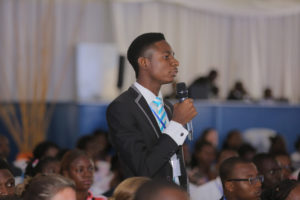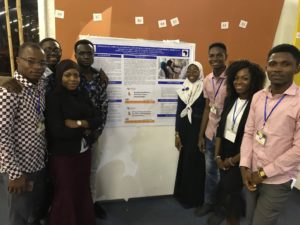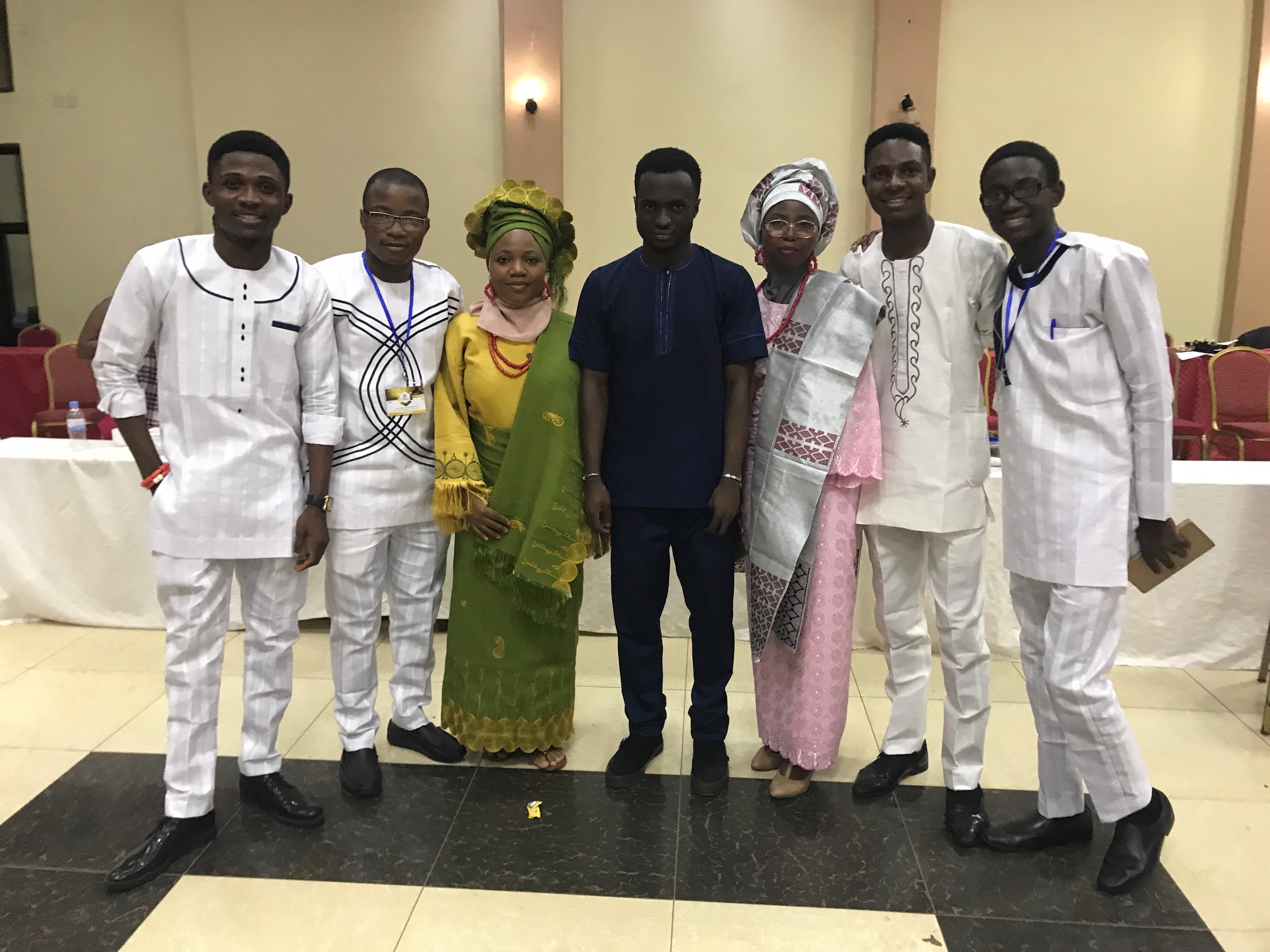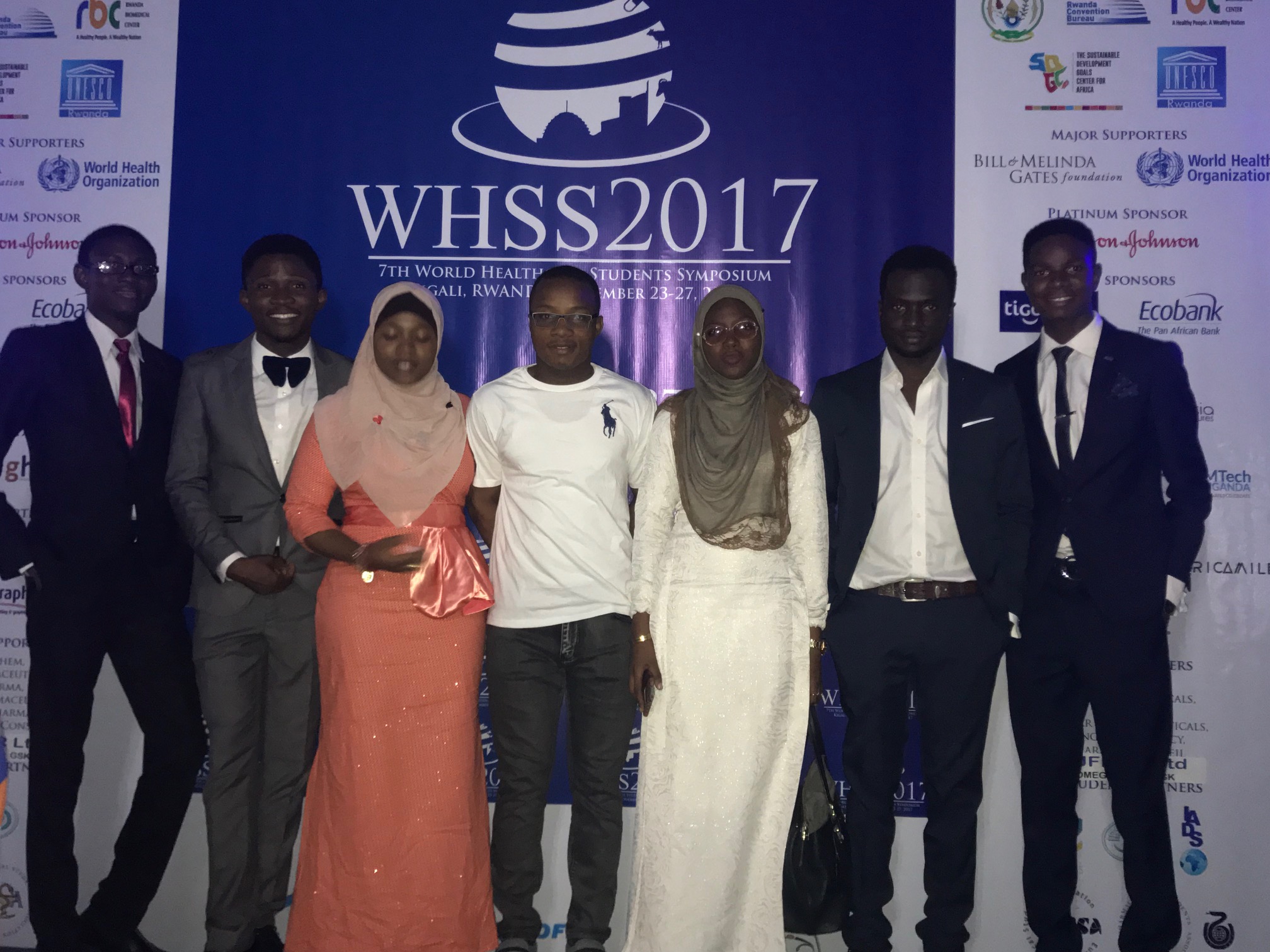It is not uncommon to see medical students do outstanding amazing things, especially in the developed parts of the world, where things work and hard work is rewarded. It is however not so common to have medical students in the developing parts of the world, break through the odds and make a name for themselves.
Recently, some Students of College of Medicine, University of Ibadan, made their way to the beautiful city of Kigali, Rwanda for the 2017 World Health Students Symposium (WHSS 2017). Seven of them, from the 2015 Class, including Adebowale Bolanle, Afolaranmi Segun, Arowojolu Oreoluwa, Ghazal Ismat, Nwaduru Chinedu, Oyebamiji Fawaz and Omiye Tofunmi. The UIMSA Clinical Press had a one-on-one with one of the attendees, being of the opinion that such a life changing experience should be extended to the public, and especially health-allied students.
Clinical Press (CP): Can we meet you?
Tofunmi: My name is Tofunmi Omiye, a 5th year medical student, University of Ibadan. I serve as the Director of media external of the Federation of African Medical Students’ Associations (FAMSA) where I am focused on an overhaul of the association by prioritizing inclusiveness of medical schools across Africa and sustainable partnerships alongside Pan-African awareness campaigns that closely align with our goal of improving the health of Africa. I am the Team leader of The Ace5 Initiative, a charity organization that is focused on the orphaned and less-privileged children, especially in the key area of education.
University of Ibadan. I serve as the Director of media external of the Federation of African Medical Students’ Associations (FAMSA) where I am focused on an overhaul of the association by prioritizing inclusiveness of medical schools across Africa and sustainable partnerships alongside Pan-African awareness campaigns that closely align with our goal of improving the health of Africa. I am the Team leader of The Ace5 Initiative, a charity organization that is focused on the orphaned and less-privileged children, especially in the key area of education.
I am also a member of the UIMSA quiz club that recently won the GSK-Emeritus Professor O.O. Akinkugbe Inter-medical school quiz competition. I am really passionate about medical research and I lead a group of like-minded young medical researchers.
CP: Tell us what the conference was all about
Tofunmi: The World Healthcare Students Symposium (WHSS) is the largest gathering of healthcare students anywhere in the world; veterinary medicine students, dental, medical, pharmaceutical, medical laboratory and students in other allied healthcare professions.
The idea behind the conference was from an understanding of the fact that in moving forward, in solving health care problems in future, we need collaborations and a multidisciplinary approach. We need all healthcare professionals to come together in order to solve problems. It has been for a while now; the last one was the first time it was held in Sub-Saharan Africa! The Rwanda Pharmaceutical Students’ Association (RPSA) hosted it in Kigali, Rwanda. The theme for the conference was “Towards the SDGs Agenda 2030: The role of multidisciplinary Approach in Healthcare”. The idea was for everyone to come together to achieve the Sustainable Development Goals (SDGs). Now, with the SDGs, we have seen that partnership, relevance, stakeholders, collaborations with everyone, that is how we can achieve this, and that is what the conference is all about.
Under the theme, there were subthemes that concerned SDGs like: Universal Health Coverage; One Health; Migrant health Antimicrobial Resistance (there were plenary sessions on these) and some other key topics including Non-communicable diseases, Global health, Finance in healthcare etc. There were also hackathons in the field of healthcare and education. In addition, there were workshops on neonatal care, global health, and multicultural trauma treatment.
CP: Why did you go for the conference?
Tofunmi: There was this day, I was checking my phone, and I was on Instagram. I saw this conference and I was like wow, this looks very awesome, and then I saw the topic and I realised that we could actually go for it!
We were working on a research, which we were finalizing at that point which really took some time to complete. I realised that the research keyed into the theme of the conference. I realised that there was an abstract session for projects, and Antimicrobial Resistance (AMR) was among, we had just done an AMR campaign, which was recognised by United Nations and Science museum, London so, it would be cool if we get to present it. I was also thinking that, being the first time it would be held in sub-Saharan Africa, it would be cheaper to go compare to Switzerland and Macedonia (places it has been hosted previously).
I called on my friends, in the Research group, and we thought about the collaborations we could make, things we could learn and get to present our paper, to let the world know about what we are doing here in Ibadan. In addition, being the chairperson of the forthcoming FAMSA General Assembly, I thought about the fact that it could be an avenue to publicise the conference and get a lot of sponsorship. Lastly, for me, I wanted to get out of this country and get some fresh air… wow, this place is choking!
CP: What were your expectations before going for the conference?
Tofunmi: I was looking forward to our presentation. I thought it was going to be amazing! I looked back at what had been done and I think it is unique and a thing of substance and with it, we could get many collaborations. I had a to do list actually and one of the items was to get collaborations not just for the research but also for the Scientific Conference that we are going to be hosting. Another thing is that we were going to be learning about core and hot topics on global health and health care in general and to understand what multidisciplinary approach means. Also, to connect to international audience and to learn about how to organize a world conference. The workshop, I was looking forward to it. The way the conference was organized, the organizers did a nice job of wetting the appetite of participants. I mean, there were bimonthly digests, updates and all. I as well wanted to explore the city, Kigali, said to be the most beautiful city in Africa!
CP: What were the things you achieved in the course of the conference?
Tofunmi: I achieved a lot, virtually everything I planned. I learnt a lot. I made many connections with people, very big people, including sponsors. I met the Organizing Committee (OC) chairperson on how to organize a world-class conference. I learnt a lot from the trauma workshop I attended. I was glad about the presentation it was awesome. I mean the people that came around really loved it. It was unique! After so much work and research and finally seeing it up there, at the presentation, it was some experience for us. We hoped to get things that could help upgrade our school, to position our institution as the foremost institution, not just in West Africa, but also in the other parts of Africa.
CP: Given more time in Kigali, what would you have done?
Tofunmi: I would have explored the whole city. To be sincere, it is a beautiful place. The shocking part for us is, and I think I am speaking for all of us that attended the conference from here, things work there! If you were going to Paris or Switzerland and things are working, you would not be bothered, but these are black people. They worked together to make their country better. Everybody was nice. The roads were all good. There was free Wi-Fi in many places. I would have talked to more people, make more partnership and the likes.
CP: What have you learnt, in going for the conference?
Tofunmi: People are doing stuff! We do not know and here in Ibadan we say, “We are Ibadan.” I do say it also. I mean, we got to the conference, said we are from the University of Ibadan and people were like, what? They did not know us. As students, we can do amazing stuff. We do not have to wait as they have conditioned us here to do. We can spread our wings and do some ‘crazy’ things because students are doing amazing things in other places. L
Likewise, institutional support, it was crazy there. I do not know but I will like to use this platform to say this, I mean we have been to different places. Before now, we went for Lagos Model United Nations Conference and we saw many research results from the University of Lagos. That time I was standing delegate. Then, we won Dokita quiz competition. The truth is we have seen other schools, the way they glorify the things that they win. We have seen institutions publish the achievements of their students on their websites. It was a lot of struggle to leave. We did not ask the College for money, we just asked for permission to leave and, they stressed us. I mean, we had sleepless nights, at some point, I almost cried! It was that crazy. There is no institutional support here, at all! It is not a Nigeria problem but that of Ibadan medicine. UNILAG, I remember when we went the Dean was present to support them. The Vice Chancellor, he knew his people! Students were his priority.
Those were the key things I learnt, the fact that as students, you can do amazing things. Students and WHO sponsored organized it, Bill and Melinda Gate as well, the big people that sponsor big conferences sponsored. Moreover, there was a lot of institutional support, which we enjoyed.
CP: Share with us some of the resolutions you have made
Tofunmi: One is to explore the world. There was a cultural night and, we were exposed to different cultures from different places, at different points in time. Other things were to continue in the things I have been doing before, it was like a dream becoming a reality realizing that as students, we can actually do much more. To do stuff and keep on going! We say the sky is the limit but really, the sky is not the limit. I do not know if this is a resolution but low-key, we became ‘woke’ to the situation of things in the country. When we got back to the airport, we were delayed for hours. Then, our car was towed. We were all just uncomfortable. Actually, we went to two different countries, we had a stopover at Addis Ababa, Ethiopia. There was nothing like our experience at the Nigerian airport. I do not know how but we have a lot to do in this country.
Lastly, I must learn at least two languages, French and Swahili!
CP: In what way have you put the things you learnt to use?
Tofunmi: Firstly, as regards my position in FAMSA, is collaboration. Before the Conference, there was International Pharmaceutical Students Federations collaboration. During, and even after the conference, we collaborated with European Medical students Association. These things were happening for the first time in history. Even for a students’ association In Africa, there have not been such collaborations. I am passionate about the African continent. I have realised that in solving health care problems here, we need to come together, collaboration, partnership. This is evidenced by the European Medical Students Association collaboration. There are other things coming very soon and I think the world will see these awesome things.
CP: Your research paper was published at the conference, how do you feel about that?
Tofunmi: The publishing…awesome! Let me tell you this, people might not know but there were many ‘under G’ stories to it. For all of us, it was not that we had money and we decided among ourselves to go to Rwanda. When I saw the abstract poster was when I saw the conference information. The deadline was in ’24 hours’. I remember, I was not feeling too fine, Segun was in Igboora and Chinedu can attest to this, we submitted the abstract the last minute of the deadline. When we were submitting the abstract, I was vomiting. I was very sick, so much stress. So much intense work within 24 hours, we submitted two abstracts, everything from scratch, not as if they were ready. Seeing it there, coming out in print, it was cool. We are working on the manuscript now to be published in a full journal. I think it was a beautiful experience for everyone that got involved in the research, over ten of us. Some collated data, questionnaire assessment, and proposal writing, for everyone, it was an awesome experience.
people might not know but there were many ‘under G’ stories to it. For all of us, it was not that we had money and we decided among ourselves to go to Rwanda. When I saw the abstract poster was when I saw the conference information. The deadline was in ’24 hours’. I remember, I was not feeling too fine, Segun was in Igboora and Chinedu can attest to this, we submitted the abstract the last minute of the deadline. When we were submitting the abstract, I was vomiting. I was very sick, so much stress. So much intense work within 24 hours, we submitted two abstracts, everything from scratch, not as if they were ready. Seeing it there, coming out in print, it was cool. We are working on the manuscript now to be published in a full journal. I think it was a beautiful experience for everyone that got involved in the research, over ten of us. Some collated data, questionnaire assessment, and proposal writing, for everyone, it was an awesome experience.
CP: What are the challenges you encountered in going for the conference?
Tofunmi: Ehn…ehn…they were many. The first was money; of course, finance is always the biggest challenge. Many people helped us, some people didn’t care, as usual. Another was getting permission to go. I do not want to use some words but this school is actually funny. I mean students have been accepted to present at a conference, probably one of two in the whole of Africa, it puts the name of the school out there. Okay, grant us permission to go then, struggle lane unfolds. We had to write, and copy many people. There was no internal support; it was a very big issue. It also clashed with our test, because of the strike. About that, I do not blame our school it was a national issue. I want to use this medium to appreciate Group B, D, A and F 2015 Class especially for my group (group B and D). We all had to sign a document to have a shift in the date of our test, allowing us to be able to go for the conference. Imagine getting 39 people, close to the end of posting test, to sign a document.
Another was getting there, and getting to present our paper. Also to get the presentation printed. Dokita quiz came up the weekend. When our quizmaster told me about the Dokita quiz Finals, I was not happy about the timing. Preparing for test, preparing for the quiz, preparing to travel, I think those were the challenges. At least, I am grateful to God that we are able to make it. We went and we came back.
CP: What advice do you have for Ibadan Medical Students?
Tofunmi: I will say, “Bite more than you can chew and chew as fast as you can”. People should open their minds to different things and there seems to be no limit to the things you can do. Do not be local in your thinking, we are competing on a global scale and, compared to our fathers, things have changed. There is the internet that puts everyone on the same platform. I am going to talk about ‘Lase’ now, who is like a mentor to me. Segun and I, we were involved in the whole Rhodes scholarship process. That is just evidence of the fact that you cannot say because you are a medical student, you cannot do this or that. You cannot know about government, politics, or things like that. You can change things as youths. We have so much power. Not everything is about medical school. Most renowned medical schools in the world today have reduced emphasis on clinical exposure. They understand that the world has changed and, I think the average Ibadan medical student needs to understand that. Do stuff you are interested in and, try to make impact.
CP: Are there things you did not like as regards the conference?
Tofunmi: What did I not like…what did I not like…what did I not like… I am not so sure!
The conference was so awesome. Okay…apart from the time when they said they were going to take us for adventure night and there was some form of misinformation.
CP: Do you think such an event can be organized here in the college?
Tofunmi: Hmmm…so, this is a very personal question for me. When I got back to Nigeria, even up until now, I am still ‘low-key’ down. Really, that was what we envision for the FAMSA conference, to be sincere if not something bigger than that, mad stuff! However, I do not think Nigeria as a country can equip or support that kind of a thing. I mean, the city is the fifth safest in Africa, most beautiful in Africa, cleanest in Africa, a lot of government support. The minister of health came, that of education came, the president would have but he was not around. When these people came, there was no convoy! Everybody was so happy. Everyone was clean. On getting to Nigeria, everywhere smelled, people were asking for money. I am a very optimistic person but I really do not know. I think we can have it, and we are going to, come May/June next year (2018). There is so much the college can learn, also the University of Ibadan, from the conference, just by summoning us the attendees and getting feedbacks, which is the case in ideal situations. Therefore, I strongly believe we can, we just need to work together. #WeCanDoMore #WeCanChangeTheNarrative #WeCanChangeThings.
CP: Why #IbadanToTheWorld?
Tofunmi: When we got it accepted, I posted it on the research group! Really, people out there do not know us as much as we thought. They were like what is Ibadan?
For us, the hash tag was one that epitomizes our exhibition to the world out there as students. It is a trending thing now, same for ‘Lase’, being a personal thing for me. I just hope the college can recognise it. Recognition from the college will make things better and get people interested in doing stuff. It is important to understand as students that we can take on the world and I think that is what birthed the tag.
Dear reader, you might not have had a front sit experience of the conference, the interview should have added to you, in one way or the other. Read about these things, think about these things, and work at achieving these things. Do you dream of a changed world? Do you want to take Ibadan to the world? It starts with you. Do something!



3 comments
Awesome!!
We truly can change the narrative. Many little steps!!
Thanks a bunch for sharing this with all folks you really understand what you’re speaking about! Bookmarked.
I appreciate your wp theme, wherever do you get a hold of it through?